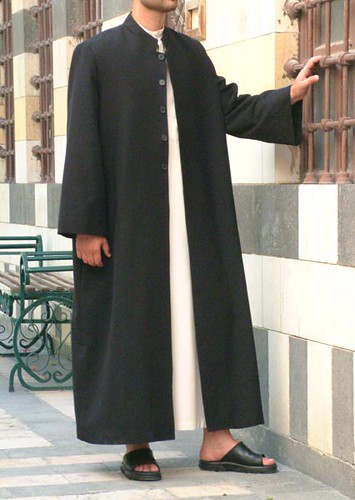baghdad burning, a female blogger in iraqi, recounts her most recent run-in with the Muslim Thought Police:
Last week my cousin needed to visit the current Ministry of Higher Education. After the ministry building was burned and looted, the employees had to be transferred to a much, much smaller building in another part of the city. My cousin’s wife wanted to have her college degree legalized by the ministry and my cousin wasn’t sure about how to go about doing it. So I volunteered to go along with him because I had some questions of my own.da3wah is the word for '(muslim) missionary', which gives you some idea of the ideological origins of this party.We headed for the building containing the ministry employees (but hardly ever containing the minister). It was small and cramped. Every 8 employees were stuck in the same room. The air was tense and heavy. We were greeted in the reception area by a bearded man who scanned us disapprovingly. “Da’awachi,” my cousin whispered under his breath, indicating the man was from the Da’awa Party.
What could he do for us? Who did we want? We wanted to have some documents legalized by the ministry, I said loudly, trying to cover up my nervousness. He looked at me momentarily and then turned to the cousin pointedly. My cousin repeated why we were there and asked for directions. We were told to go to one of the rooms on the same floor and begin there.here's a man wearing a jubbah.“Please dress appropriately next time you come here.” The man said to me. I looked down at what I was wearing- black pants, a beige high-necked sweater and a knee-length black coat. Huh? I blushed furiously. He meant my head should be covered and I should be wearing a skirt.
I don’t like being told what to wear and what not to wear by strange men. “I don’t work here - I don’t have to follow a dress code.” I answered coldly.
The cousin didn’t like where the conversation was going, he angrily interceded, “We’re only here for an hour and it really isn’t your business.”
“It is my business.” Came the answer, “She should have some respect for the people who work here.” And the conversation ended.
I looked around for the people I should be respecting. There were three or four women who were apparently ministry employees. Two of them were wearing long skirts, loose sweaters and headscarves and the third had gone all out and was wearing a complete jubba or robe-like garb topped with a black head scarf.

the jubbah is the origin of the 15th CE French jupe "tunic" and jupon "undertunic" and Portuguese gibão. these were borrowed into Japanese as jiban "underrobe for a kimono" and zupon "trousers". (thanks to shukr for this pic of the jubbah they have for sale right now.)
My cousin and I turned to enter the room the receptionist had indicated and my eyes were stinging. No one could talk that way before the war and if they did, you didn’t have to listen. You could answer back. Now, you only answer back and make it an issue if you have some sort of death wish or just really, really like trouble.Young females have the option of either just giving in to the pressure and dressing and acting ‘safely’- which means making everything longer and looser and preferably covering some of their head or constantly being defiant to what is becoming endemic in Iraq today. The problem with defiance is that it doesn’t just involve you personally, it involves anyone with you at that moment - usually a male relative. It means that there might be an exchange of ugly words or a fight and probably, after that, a detention in Abu Ghraib.
If it’s like this in Baghdad, I shudder to think what the other cities and provinces must be like. The Allawis and Pachichis of Iraq don’t sense it- their families are safely tucked away in Dubai and Amman, and the Hakeems and Jaffaris of Iraq promote it.
No comments:
Post a Comment